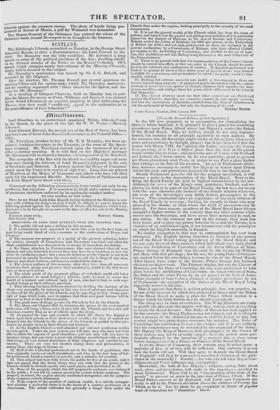[]•fom the Second Edition of last Spectator.]
In the bill now prepared, or in preparation, for naturalizing the Queen's future husband, it is proposed to give a power for confiirring precedence upon Prince Albert above her Majesty's uncles the Dukes of the Blood Royal. This, we believe, would be not only unprece- dented, but contrary to all principle applicable to such matters. By the concision law,the Sovereign might confer on his subjects whatsoever place and precedency lie thought proper ; but it has been held that the statute 31st Henry VIII. for " placing the Lords," restrains the Crown from granting to a Peer a higher place than the date of his patent would entitle him to claim ; and under the acts of Union with Scotland and Ireland, the Crown cannot, by its own authority, grant to persons not Peers precedency over Peers, or assign to any Peer a place higher than belongs to the date of his creation. An act of Parliament, there- fore, becomes necessary to enable her Majesty to bestow upon Prince Albert the rank and precedence destined for him lea the Royal mind. Should Parliament pass the bill for the purpose mentioned, it will become a party to the degradation of the Blood Royal. Next to the King, the Royal Family are held in highest consideration by the law. Although thee wires of the King's sons, grandsons, brothers, and ne- phews, are held to be part of the Royal Family, the law does not invest with the sauce character the husband of any female relation whatever, not even of the Sovereign's only child, heiress presumptive to the Crown. The constitution takes no cognizance of any male relation of' the Royal Family by wirriage ; limiting its regards to those who may succeed to the throne, or from -whom the rig-let of succession may be derived. For these reasons, members of the Blood Royal have always occupied a higher station in the country than any other persons what- soever save the Sovereign, and have never been postponed in rank to any others. By the common law and by the statute, their rank has been fixed ; and to place any person between them and the Throne, is a violation of an established right, if not inconsistent with the principles on which the English monarchy is founded.
No similar usurpation to that now in contemplation has ever beer attempted. The English history furnishes eo instance of any person not of the Blood Royal taking precedency of the Blood Royal; and we can only discover three cases in which individuals have been placed above the Archbishop of Canterbury and the Great Officers of State. Prince George of Denmark was invested by the statute 1st William and Mary with that privilege ; but his son, the young Duke of Glouces- ter, ranked before his own father, because he was of the Blood 'Royal. After Queen Anne came to the throne, Prince George her husband obtained no higher rank. The Princess Sophia, her son the Elector of Hanover, and the Duke of Cambridge leis son, were authorized to take place before the Archbishop of Canterbury, the Great Officers of State, the Dukes and the other Peers, by an act passed in the 10th of Anne. Prince Leopold of Saxe Coburg obtained a similar precedence by act of Parliament—the exception of tlee Dukes of the Blood Royal being especially named in his case. Thus it appears that there is neither principle, law, nor practice, in favour of the measure by which it is proposed to thrust aside the Dukes. of the Blood Royal to make a place for Prince Albert nearest to a throne which his birth forbids that he should ever inherit.
The thing may be done nevertheless. The Whig Ministers are ready to gratify the Queen in this matter: will they, indeed, stick at any thing to retain flue Royal favour? The Duke of Sussex has been applied to for his consent : his Royal Highness has not refused, and it is thought that a promise of the additional income so shabbily denied to hien last session might in a great degree overcome his scruples. The Duke of Cambridge has undertaken to waive his claims ; and it is not unlikely that his complaisanee may be rewarded by the command of the Army. His Majesty the King of Hanover, heir presumptive to the Crown of these realms, may not be so easily sopped : he is the person most par- ticularly affronted by the intrusion of a stranger into a place never before occupied save by a Prince or Princess of the Royal Blood. As to the House of Commons, their consent may be relied upon : a majority of five, or of two, will be sufficient. Oar curiosity is to see how the Lords will act. Will they agree to degrade the Blood Royal of England? will they be won over to sanction a violation of the prin- ciples of the monarchy ? Possibly ; for who can tell what Royal blan- dishments and Court influence may accomplish? Meanwhile, the bulk of her Majesty's subjects, caring little about rack, place, and precedency, will smile at the importance attached to those distinctions. There will be no " interposition of the body of the people" to prevent or assist in the intrusion of Prince Albert. If the Royal Dukes consent to be degraded, and Lords and Commons are ready to aid in the Prince's elevation above the children of George the Third, so be it. But let there be no complaint in future of popular want of veneration for " illustrious " blood.


























 Previous page
Previous page